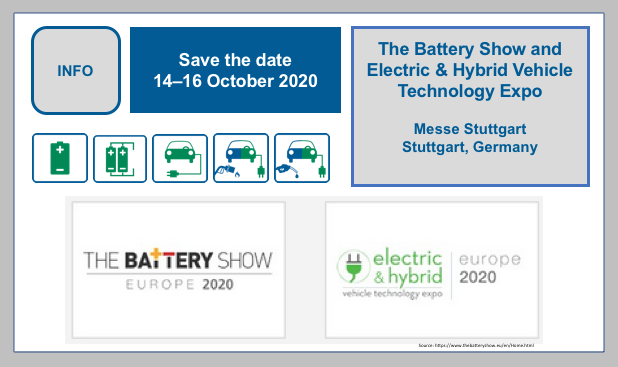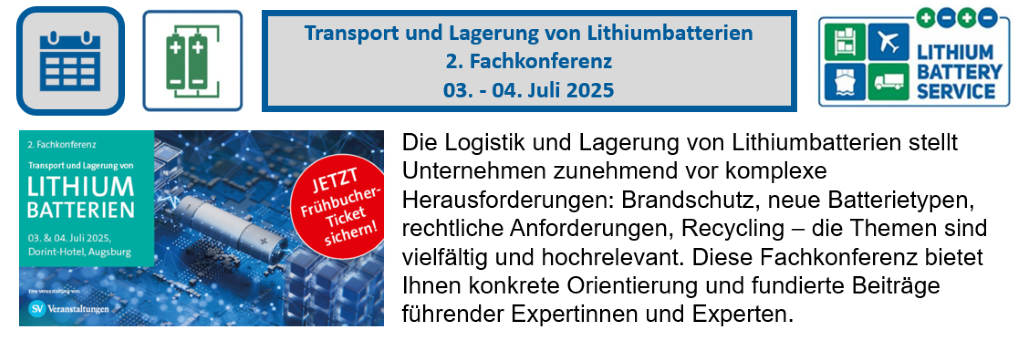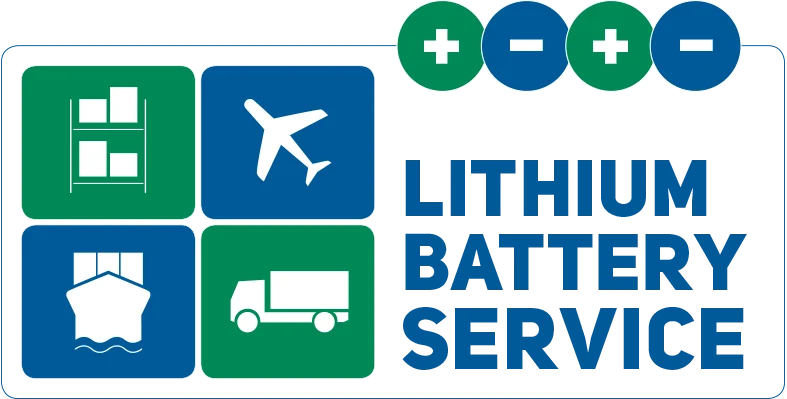The Battery Show and Electric & Hybrid Vehicle Technology Expo at its new time: 14–16 October 2020.
The Battery Show and Electric & Hybrid Vehicle Technology Expo at its new time: 14–16 October 2020. Europe's largest trade fair in the field of lithium-battery-technology and e-mobility takes place in Stuttgart, Germany this year.

The Battery Show and Electric & Hybrid Vehicle Technology Expo at its new time: 14–16 October 2020.
Europe's largest trade fair in the field of lithium-battery-technology and e-mobility takes place in Stuttgart, Germany this year.
https://www.thebatteryshow.eu/en/Home.html
Not only experts but also battery manufacturers and suppliers will participate in the trade fair.
New Advances in Battery-Technology and batteries for the entire supply chain for hybrid and EV are the topics of the Trade Fair:
Lithium-battery-technology, enhanced efficiency, thermal management and increasing safety and a lot other.
If you and your company also develop, manufacture, install or distribute lithium batteries, you are aware of the challenges involved in shipping lithiumcells and -batteries needed in vehicles or other applications worldwide.
With lithium-cells and lithium-batteries there are some things to consider before transport.
Every lithium cell and every lithium battery must be manufactured according to the quality management program described in the transport regulations, including prototypes.
What this quality management program includes, you can find here:
https://www.lithium-batterie-service.de/en/quality-management-program
And the following technical requirements have to be fulfilled for large lithium ion batteries of the vehicle:
- Each lithium ion battery incorporates a safety venting device or is designed to preclude a violent rupture under normal safety conditions.
- Each lithium ion battery is equipped with an effective means of preventing external short circuits.
- Each lithium ion battery containing cells or series of cells connected in parallel must be equipped with effective means as necessary to prevent dangerous reverse current flow (e.g. diodes, fuses etc.).
Every lithium cell or lithium battery that is no longer a prototype or a small series of up to 100 pieced, must have been successfully passed the UN test series 38.3.
The UN test series 38.3 includes the following:
https://www.lithium-batterie-service.de/en/un-38.3-test-series
Incidentally not only the large lithium ion vehicle battery must meet the requirements of the dangerous goods transport regulations but also every other lithium button cell, lithium cell or lithium battery installed in the vehicle.
If you have to ship or dispose large or small lithium batteries, we offer checklists for your transport case according to ADR, IMDG-Code and ICAO-TI / IATA-DGR including source references.
So you can check, which regulations have to be observed, how you pack, label and document correctly.
You will receive all the necessary transport documents for your transport case (e.g. transport document according to ADR, IMO declaration, shipper's declaration).
You can find the respective checklist article in our portal under "Find a single checklist".
https://www.lithium-batterie-service.de/en/checklist?tab=1
Since 01.01.2020 a UN 38.3 Test Summary needs to be provided by the manufacturer and any subsequent supplier on request. We have included all required details of the UN 38.3 Test Summary in our Supplier Inquiry Form.
Our supplier inquiry form helps you to get all necessary information for logistics. You´ll find it here:
https://www.lithium-batterie-service.de/en/downloads-guest
We support you in making all preparations for shipping in compliance with the regulations. If you have any questions, please feel free to contact us:
https://www.lithium-batterie-service.de/en/contact/consulting












